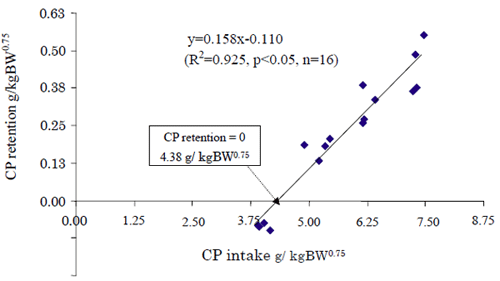Protein requirements for maintenance of native beef cattle in Northeast Thailand
Description
In Thailand, the nutrient requirements of the cattle are based on information gathered from countries located in the temperate zones. Since the breed of cattle, climatic conditions, and available feed resources in Thailand differ from those in the temperate zones, the nutritional requirements of the cattle in Thailand may not be the same as those recommended. However, the protein requirements of native cattle have been measured to a limited extent. In Thailand, native and Brahman cattle are very popular for their beef. This time, we conducted feeding experiments in order to estimate the protein requirements for the maintenance of the native cattle.
Four Thai native heifers, with average 132±1.71kg of body weight, were used to determine the protein requirement using a 4×4 Latin square design. The cattle were fed with diets containing 6.1, 9.4, 12.1 and 15.4% of crude protein (CP). The diets were prepared in a total mixed ration with rice straw as the roughage source. The results showed that Nitrogen (N) intake and retention significantly increased (p<0.05) when the dietary protein level was increased. Therefore, the protein requirement for the maintenance of Thai native heifers was lower than 6.1 % of dietary CP (Table 1).
Sixteen Thai native calves, with average 105±9.3 kg of body weight, were used to determine the protein requirement for maintenance. The calves were fed with diets containing 5.3, 7.1, 8.3 and 9.8 % of CP. The diets were prepared in total mixed ration with Mulato II grass hay (a hybrid of three lines of Brachiaria; B. ruziziensis × B. brizantha × B. decumbens) as a roughage source. The results showed that the negative N balance was found in the dietary CP content of 5.3 %, but the positive N balance was found in the dietary CP contents of 7.1 - 9.8 %. Therefore, the protein requirement for the maintenance of Thai native calves is between 5.3 and 7.1 % of dietary CP. Moreover, the prediction equation of N retention (Y, g/kg BW0.75) with relation to N intake (X, g/kg BW0.75) was obtained from simple linear regression (Figure 1). From the linear regression results, it can be estimated that the CP requirement for maintenance (Y = 0 or N retention = 0) of Thai native male calves is 4.38 gCP/kg BW0.75.
Figure, table
-
Table 1. Effects of dietary protein levels on the growth performance and protein balance of Thai native heifers
-
Fig. 1. Relationship between CP retention and CP intake in Thai native cattle.
- Affiliation
-
Japan International Research Center for Agricultural Sciences Animal Production and Grassland Division
- Classification
-
Technical A
- Term of research
-
FY2008(FY2006~2011)
- Responsible researcher
-
OTSUKA Makoto ( Animal Production and Grassland Division )
THUMMASAENG Kungwan ( Ubon Rajathanee University )
CHANTIRATIKUL Annut ( Mahasarakham University )
- ほか
- Publication, etc.
-
Chumpawadee, S., Chantiratikul, A., Rattanaphun, V., Presert, C. and Kookaew, K. (2009) Effect of dietary crude protein levels on nutrient digestibility, rumen fermentation and growth rate in Thai-indigenous yearling heifers. J. Anim. Vet, Adv. 8(2), 297-300.
Chantiratikul, A. and Chumpawadee, S. (2009) Protein requirement of yearling female Thai-indigenous cattle. JIRCAS Working Report 64, 48-50.
Senarath, S. et al. (2009) Protein requirement for maintenance of yearling Thai native cattle. JIRCAS Working Report 64, 83-86.
- Japanese PDF


